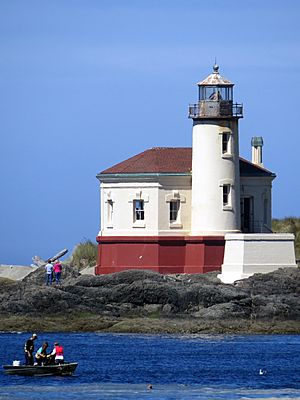Coquille River Light facts for kids
 |
|
| Coquille River Light | |
|
|
|
| Location | Bandon, Oregon |
|---|---|
| Coordinates | 43°07′26″N 124°25′27″W / 43.123911°N 124.424222°W |
| Year first constructed | 1895 |
| Year first lit | 1896 |
| Deactivated | 1939 |
| Foundation | Rock/concrete jetty |
| Construction | Brick/stuccoed |
| Tower shape | Conical attached to signal building |
| Markings / pattern | Red and white tower, black lantern |
| Height | 40 feet (12 m) |
| Focal height | 47 feet (14 m) |
| Original lens | Fourth order Fresnel |
| Current lens | Solar (1991) (visible only from Bandon) |
| Range | 12 nautical miles (22 km; 14 mi) (formerly) |
| Characteristic | 28 seconds on, 2 seconds off |
The Coquille River Light is a historic lighthouse located near Bandon, Oregon in the United States. It was once known as the Bandon Light. Today, the Oregon Parks and Recreation Department takes care of it. It is part of Bullards Beach State Park. Lighthouses like this one help guide ships safely.
Contents
History of Coquille River Light
Building the Lighthouse
The Coquille River Light was first called the Bandon Light. It was finished in 1895. The light turned on for the first time on February 29, 1896. Its job was to help sailors. It guided them past dangerous, moving sandbars. These sandbars were at the entrance to the Coquille River and the harbor in Bandon.
The lighthouse had a special Fresnel lens. This type of lens made the light very bright. A wooden walkway connected the light to the keeper's house. Lighthouse keepers lived there and made sure the light worked.
Changes and Challenges
In September 1936, a large wildfire swept through the area. It destroyed most of Bandon town. Because of this, fewer ships came to the harbor. The town faced financial difficulties.
The Coquille Light was shut down in 1939. An automated light on the south jetty replaced it. This new light did not need people to operate it.
Fog Signals
The lighthouse originally had a Daboll trumpet. This was a type of foghorn. It made a loud sound to warn ships in foggy weather. However, sometimes the sound did not travel well.
In 1910, a more reliable fog siren replaced the trumpet. Sailors liked the new siren. But many people living in Bandon did not. They found it too loud. After the lighthouse closed, the siren was removed. The Fresnel lens was also taken out.
Restoration Efforts
For 37 years, the lighthouse was not cared for. It started to fall apart. People also damaged it.
In 1976, the first major restoration began. Sadly, the keeper's house was too damaged to fix. It and other small buildings were removed.
In 1991, a new light was put in the tower. This light uses solar power. It is still visible from Bandon today. More renovations have been done since then. The lighthouse is now a popular place to visit.
 | Janet Taylor Pickett |
 | Synthia Saint James |
 | Howardena Pindell |
 | Faith Ringgold |


